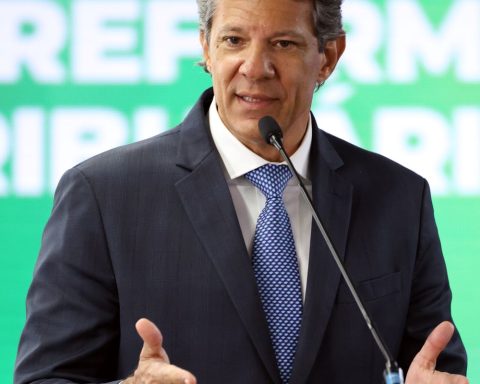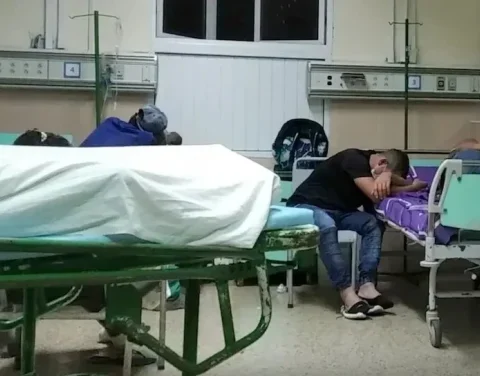Last Tuesday, September 6, in the context of the first cabinet change in the Government of President Gabriel Boric, two days after the overwhelming victory of Rejection in the exit plebiscite, expectations arose around the fate of two of the ministers whose performance was harshly criticized and that, furthermore, they played a key role in the successful presidential campaign. On the one hand, Izkia Siches, who did not meet expectations at the head of the Ministry of the Interior and Public Security and who, after several unforced errors, finally left La Moneda Palace, in tears.
Although Siches played a leading role in the campaign that allowed Boric to become President, his departure from the cabinet is explained –according to analysts and voices within the ruling party– by the fact that he never managed to cross the line of trust to position himself within the intimate circle that surrounds the President, made up of close friends and collaborators who have accompanied him for much of his political career. A space that Giorgio Jackson is part of, questioned in his role as minister of the General Secretariat of the Presidency (Segpres), where parliamentarians from different sectors accused poor performance, far from the original expectation, betraying few negotiations and little credibility as interlocutor with the different benches that make up the National Congress.
During the almost six months that he headed the Segpres – a portfolio that forced him to have a direct relationship with a Congress in which the ruling party is not the majority force – Jackson saw his management tense due to the decline of the failed constitutional process, being one of the defenders of the thesis that linked the destiny of the Government with the result of the exit plebiscite. But the citizens decided to reject the proposal of the Constitutional Convention, and an important part of the political capital of the former deputy and founder of the Democratic Revolution (RD) and the Broad Front (FA) was put in check. Although there was speculation about his possible departure from the cabinet, President Boric had other plans for one of his closest collaborators, understanding that he needed to shield him, give him a vote of confidence and rotate him to another ministry, one in which he could recover part of his leadership. .
In the change of cabinet, the President decided to hand over the command of the Ministry of the Interior and Segpres to two experienced women whose arrival meant the balance of forces in favor of a Democratic Socialism that demanded to occupy positions of power. Thus, Carolina Tohá (PPD) and Ana Lya Uriarte (PS) assumed the positions available after the departures of Siches and Jackson, the latter willing to take on a new challenge, this time in a Ministry of Social Development that at that time was without voice of command, after the controversial departure of Jeanette Vega, questioned for trying to coordinate a meeting with the leader of the Arauco-Malleco Coordinator (CAM), Héctor Llaitul.
In this context, from his party they believe that Jackson’s arrival at the Social Development portfolio is not a step backwards in his political career, assuming that his absence in the political committee is compensated by the “direct line” that the minister has with the mandatary. The DR’s helmsman, Senator Juan Ignacio Latorre, believes that “the President values, without a doubt, the reflections and opinions of Minister Jackson, there is a relationship of trust built, and in a scenario of strong threats and communication operations of the adversary , it is also important that he has people from his circle of trust, but that at the same time he has a good political evaluation of his performance, and that goes beyond whether or not he can be seated in the political committee every week , because we know that there is a direct line between Minister Jackson and President Boric,” he stressed.
In this regard, the Ministry of Social Development appears as a space with less public exposure than the Segpres, also considering that with the change of cabinet it was decided to leave interministerial coordination for the Ministry in the hands of Minister Ana Lya Uriarte. Good Living Plan, a role that Jeanette Vega had played until before her departure. With this modification in the implementation design of the Plan, Jackson assumes less political responsibility than his predecessor, limiting his work to land restitution, the generation of support and support in terms of public investment and poverty reduction. A decision that – according to details from his work team – “will allow him to have more space to focus on the work of the ministry.”
It is a strategic change that some see as shielding someone who is one of the “projectable” political figures of a Broad Front that is undergoing various processes of internal rearticulation, although from his work team they believe that this change seeks to strengthen his leadership, now in a sectoral ministry. This, because they think that, if protection had been sought for him, they would have installed him in a place with less exposure, such as the second floor of La Moneda, leading his team of advisers. For the political analyst and director of the School of Government and Communications of the Central University, Marco Moreno, the support that Jackson gives Gabriel Boric has nothing to do with his institutional role as sectoral minister, but rather that the warm support, the emotional and containment contribution that he gives to the President, understanding that this is not the cold prop to make political decisions, a space that is still absent, and that –in his opinion– it is one of the main shortcomings of the Government.
“I tend to think that the President is still very captured by the warm support that his circle of trust gives him, where he is a prisoner of a complacent court that controls access to this position of power and, in some way, shields the President. I believe that, beyond the change of cabinet, it is not yet clear that Democratic Socialism has prevailed within the ruling party and, therefore, key actors of Approve Dignidad continue to form part of the circle of trust of the President, who still does not have the support that gives it a systematic support that allows cold calculation or technopolitical reasoning. I think that he is not receiving that, because he is still strongly influenced by this environment or narrower circle, where Jackson, Minister Vallejo or Minister Orellana are, plus some other advisers, who perhaps in some way do not allow the President to be able to defend itself from those sectors that are more hegemonic in decision-making”.
The design of the Plan Buen Vivir and the role of Minister Jackson
One of the axes of President Boric’s government program is the implementation of the Good Living Plan, whose execution now depends on the articulation between the Ministry of the Interior and the Segpres. This, understanding that the budget item of said plan is in the General Secretariat of the Presidency. Within this design, the Ministry of Social Development must ensure the operation of land restitution, a task in which the National Corporation for Indigenous Development (Conadi) is working -a body that depends on said portfolio-, where human resources are also involved. of the cabinet headed by Giorgio Jackson.
In this sense, analysts agree that within the official political design that was reformulated after the defeat of the I Approve option in the plebiscite of last September 4, the industrial civil engineer and close collaborator of the President is installed in a position where he will try to revitalize his leadership, assuming a challenge of less public exposure, but where it will be able to play a role in matters such as overcoming poverty, child protection, in addition to land restitution, which, at least on paper, seems to be the aspect that It entails less risk in the search to solve the conflict between the State of Chile and the Mapuche people.
It is a decision that decompresses the tension of his time at Segpres and that allows Jackson to rearm a public figure that was tainted by unfortunate statements, which even had to be clarified or denied by the President himself. Regarding his new challenge in the Ministry of Social Development, Senator Latorre (RD) admits that “although the political dialogue and the interministerial coordination work for the Plan Buen Vivir is rather in Segpres, but without a doubt, also as La Araucanía and different areas of Wallmapu have overrepresented poverty rates, obviously the Ministry of Social Development plays an important role in indigenous matters, but also in other social policies.
Precisely, from the portfolio now headed by Minister Jackson, they detail that their main focus of work is now on the implementation of the Law of Guarantees for Children, the intention to carry out a Framework Law on the National Care System, as well as the focus on the modernization and digitization of the delivery of social benefits. All matters that, although they could eventually be relevant according to the government program, continue to be outside the first line of political discussion, a space from which Jackson left with a bad experience by not being able to meet the expectations of the ruling party, which he deposited in shoulders the responsibility of building bridges with parliamentarians for the execution of its program.
For his part, the analyst and columnist for The counter, Germán Silva Cuadra considers that “Giorgio Jackson is not only close to the President, but also part of his group of friends and trust and, therefore, when the President decides to move him –which probably cost him too much–, he has to do with the signal that they sought to give to public opinion, but in a certain way it can also be interpreted as a consolation prize, which was previously seen with former Minister Pérez in the Sebastián Piñera government. change of someone very close to his environment and they keep him in the cabinet, it is because he is someone too trustworthy and because it is very costly to remove him. With that reading, Jackson remains in his direct environment and, at the same time, continues to be very exposed, beyond the fact that Social Development is a rather secondary ministry, at least from the public perspective”.
In turn, those close to Minister Jackson admit that it was his initiative to build bridges towards the former Coalition so that what is now called Democratic Socialism would emerge and fall back on the political project headed by President Gabriel Boric. But its closeness to that sector has a long history, since it was in the 2013 parliamentary campaign when the parties that made up the pact then known as Nueva Mayoría decided to omit themselves in District No. 22, corresponding to the commune of Santiago, with the objective of facilitating the election as deputy of the former student leader. Thanks to this strategic move, Jackson got a chair in the Lower House, where he began to build a political career that today has him sitting inside La Moneda.
Could it be a gesture of gratitude from Giorgio Jackson towards said sector, considering them as an essential part of his government project? The truth –analysts agree– is that what happened in 2013 is a sign that, since his beginnings in politics, the current Minister of Social Development has received support and protection from different sectors, which have shielded him and have allowed him to build a leadership that emerged from his time as a student leader, a context in which he precisely established a relationship with some then unknown Gabriel Boric and Camila Vallejo, who over time would become important allies and who today make up a space of power where decisions are possibly made inside La Moneda.


















